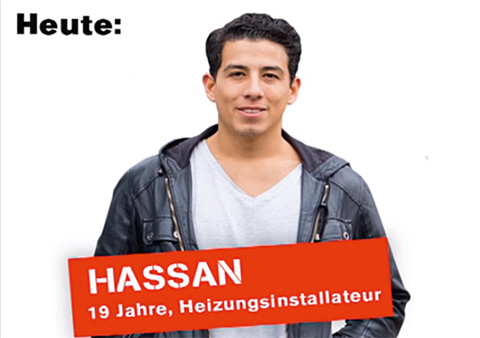"Our film has its own attitude"
Last year, around one hundred young talents took part in the ADC Young Creatives Award in teams of two in order to win a trophy and a place at the Young Lions Competition in Cannes. Werbewoche presents the four winning teams in a series.

The main sponsor and task provider was Suva. The competition was looking for communication ideas to protect apprentices from the risk of accidents at work. Chris Sapiain Wetter and Raymi Mendoza, the winners of the film category, started the competition. We talked to them about successful provocations and crossing borders in advertising.

WW: Your film is about Hassan, who can no longer operate his game console properly or get his girlfriend's bra off because of an unsavory, amputated finger. The film ends with the request "better luegsch". Do you make fun of foreigners and disabled people?
Chris: In a way, we make fun of ourselves. We communicate emotionally and uncensored, so that young people can relate to the subject matter. They see themselves in Hassan, precisely because of this humor. We analyzed the target group in advance and asked our colleagues from the construction industry. One of them is called Hassan - in gratitude for giving us an insight into his world, we gave the protagonist his name. This humor doesn't work for everyone, but it goes down very well with the campaign's target audience. Hassan thinks the film is funny.
Raymi: We don't want to act like parents who say, you shouldn't do this and that, or pay attention. That goes in one ear and out the other.
Chris: Exactly. The message of our film is: You have to know it yourself, but "luegsch better".
WW: But aren't you making fun of a serious subject?
Raymi: I think not. You do think about it in hindsight that an accident at work would not be funny. The serious message remains recognizable. We show using everyday situations like smoking, drinking or gaming: It could be really troublesome to have to do all these things without fingers.
Chris: Young people our age are pretty numb to stark facts. It's not so easy to shock us. That's why we didn't show any warning accident pictures, but thought about the consequences in a funny way.
WW: Do you think that advertising in general is too well-behaved?
Raymi: We find commercials in Switzerland mostly boring and unambitious. Insurance commercials in particular often repeat the same loveless story. It explains how safe you are with a provider and that you have nothing to worry about. Many companies don't like to go out on a limb and prefer to continue what has worked so far.
Chris: It also has a lot to do with culture. We both come from South America. There, people like to watch advertising. It's more daring, and that's why it entertains. People sit in front of the TV with their families and discuss it. Messages like that then also get through.
WW: Where do you see the boundaries that a provocative commercial must adhere to, what would definitely go too far for you?
Chris: Racism. We find the SVP posters tasteless. You can play with clichés, but then you should make fun of everyone. I think a humorous perspective is okay, but not against a certain group. Our film walks the tightrope, because what happened to Hassan could happen to any young person.
Raymi: But maybe we find it simple because we can't identify with the SVP message. If you share their attitude, you probably also find the provocation successful.
Chris: That's the problem. If you want to appeal to everyone, it becomes gray. That's why our film has its own opinion and attitude - direct, unadulterated and funny.
Interview and photo: Simone Isliker











